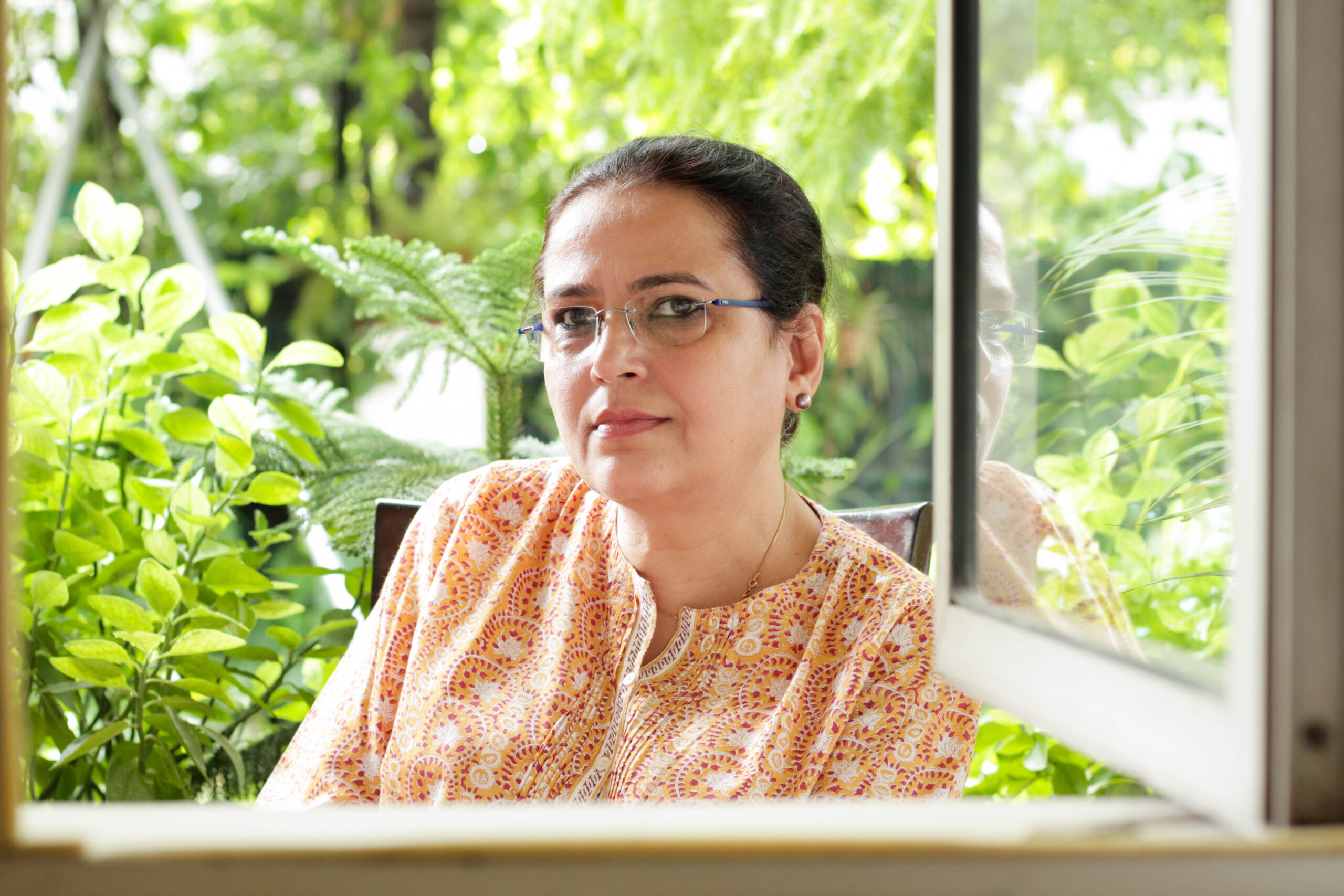
Rakhshanda Jalil
Born on 20th July 1963 in Delhi, Rakhshanda Jalil is an eminent Indian writer, translator, critic, and literary historian, with a career that has spanned over 30 years. She has worked as an academic early in her career and has been a Senior Associate Fellow at the Council of Social Development, New Delhi. She has worked as an editor in several prestigious journals and publication houses since 1987. She has over 30 books to her credit which include edited short story collections, translations, biographies, essays, and monographs on literary and cultural history. Her volume of original short stories, Release and Other Stories was published by Harper Collins in 2011. She is a regular columnist at several reputed Indian newspapers and magazines. She also runs a non-profit called Hindustani Awaaz which works tirelessly to further the cause of Hindustani literature. She has won several accolades, prominent among them being the Kaifi Azmi Award for contribution to Urdu literature, First Jawad Memorial Prize for Urdu-Hindi translation, Distinguished Translator Award by Vani Prakashan at Jaipur Lit Fest, and the Mahatma Award for her role in preserving Indian cultural heritage.
Rituparna Mukherjee from The Antonym conversed with Ms. Jalil about her wide-ranging work, her inspirations, aspirations, and of course, all things translation.
RM: You are a prolific writer and translator with over 30 works to your credit. What motivates you to write, especially translate?
RJ: I started my journey as a translator quite serendipitously. A chance meeting sometime in the year 1991, with Dr. Rao, the Editor of Indian Literature, the journal of the Sahitya Akademi, proved not only fortuitous but had consequences far beyond any that anyone could have foreseen. Dr. Rao was looking for someone to translate a particular story by Premchand, Mandir Masjid. He suggested, quite without preamble, that I should do it and he would publish it in his journal. He over-ruled my qualms about having no previous experience with translating, let alone writing. I was then working as Assistant Editor at the India International Centre and was perfectly content editing other people’s (bad) writing. Soon enough, I had pecked away industriously at my father’s battered old typewriter and presented Dr. Rao with a translation that he duly published in Indian Literature. Little was I to know then that the sequence of events that would unspool—almost in slow motion over the next three decades—from that chance meeting and that generous, almost avuncular suggestion would give birth to an undreamt-of literary career. For someone with no literary ambitions at that point and no academic interests either, that single act of translation would prove to be the foundation stone for a life-long vocation. Now 30 years later, I am still building on that single serendipitous meeting.
Looking back, it seems as though I had tasted blood after translating that one Premchand short story. Within a year, in October 1992 to be precise, I had published a collection of 10 short stories by Premchand with Harper Collins. Called The Temple and the Mosque, it was a slim book with a very short introductory note, called rather self-effacingly, ‘Translator’s Note’. Looking back, it seems odd that I was content to dub it so; perhaps the sense of ownership I now have with a text was entirely missing then.
Now when I translate, I am as interested in the text as in its context. I want to know as much about the time and circumstance in which a text was written. But to answer your question as to what motivates me, quite simply a text must ‘speak’ to me at some subliminal level. After all, one is doing literary translations. I am not a commercial translator. I am not translating a manual for washing machines. So, in that sense, translations are not a mechanical exercise. It must necessarily be a special text, remarkable in some way.
RM: When selecting an area of work, be it a cultural or historical piece or a work of translation, what is your guiding principle in choosing a text?
RJ: A text or a collection of writings must excite me; that is my primary impulse. I have never done commissioned translations or taken on projects that don’t interest me. I want to share the sense of excitement and wonder and awe that a text inspires in me first as a reader. Increasingly now I bring together my interests as a literary historian and a translator. As I said, I am now as interested in the context as the text itself. For instance, I edited a collection of writings on the First World War—The Great War: Indian Responses to the First World War (Bloomsbury, 2018)—followed by another entitled Jallianwala Bagh: Indian Responses in Prose and Poetry (Niyogi Books, 2019). Also, a collection of writings in Bangla and Urdu on the creation of Bangladesh on which I collaborated with Debjani Sengupta. With her, I am now working on the Great Bengal Famine. I want to look at historical events and how they find representation in prose and poetry. I can think of no better way to put my training as a literary historian and my abiding interest in translation to good use.
RM: You have translated some notable authors from Hindi and Urdu literature such as Premchand, Manto, Phanishwar Nath Renu, Intizar Hussain, Asghar Wajahat among others. How have these writers and their works been of significance to your own understanding of the history and culture of our subcontinent? What about these writers do you find challenging in terms of translation?
RJ: My literary ‘career’, for want of a better word, has been shaped by serendipity and projects and ideas finding me or vice versa. Each of these writers you mention spoke to me in some way and I found myself wanting to share the wonder I felt while reading them. Of these, the case of Renu is the most peculiar. I had a collection of his stories with me while I was living abroad for a year. In cold, distant Belgium, I read Renu and was enthralled. I translated one story, Aatm Saakshi while I was still in Belgium. I cannot describe the wonder and awe I felt. I am not from Bihar, and had not even visited Bihar at that point yet I felt pulled into Renu’s world. That is the hallmark of good, rather great literature.
RM: You have written an anthology of short stories—Release and Other Stories, published in 2011, as well as have recently forayed into writing Hindi stories, with Stalker being published in the December 2022 edition of the Hans Magazine. What about the short fiction form do you find interesting as a writer? How has your own experience of editing and translating short fiction shaped you as a writer?
RJ: I don’t think I am consciously influenced in the writing of short stories by my translation. As a reader, perhaps, yes. With all that one has read one can tell good writing from bad. So, yes, my own early favorites such as O Henry, Somerset Maugham, Maupassant, and Manto may possibly influence how I ‘craft’ a story. Possibly.
RM: Much of your work as a literary historian delves into the regional, political, and cultural history of North India. Partition also figures in a big way in your works, be it in your essays or your translations. What about history attracts you as an individual and why has partition featured in such a big way in your body of work? How do you research and prepare to provide accurate historical consciousness to your writings?
RJ: I think the partition is important because its consequences are still unspooling. We are not done and dusted with the act of severance. It is not behind us. It continues to affect us. There were lessons to be learned from it, especially the horrific communal violence yet sadly as a country we chose not to heed those lessons. That is why I feel the need to constantly revisit those texts, to keep excavating the messages that lie hidden there, to keep reminding people.
RM: Would you classify your work as political?
RJ: Of course. I am a political person. How can one not be? I am also a feminist. I believe the personal IS the political.
RM: When a woman writes history, it is often different. Would you agree with this sentiment being a literary historian yourself?
RJ: I don’t think a woman writes differently or only for women. That would be like saying Adivasi writing is for Adivasis or Dalit writing is or should be of interest to only Dalits.
RM: You run a non-profit organization called Hindustani Awaaz dedicated to the popularization of Hindi-Urdu literature. Why was building this organization so significant for you? What kind of work does the organization do in terms of furthering the cause of specifically Urdu literature?
RJ: I set it up in 2001 with the intention to position and promote Urdu, or rather Hindustani, the sweet mixture of Urdu and Hindi. For many years, I ran it single-handedly. Now, my daughters, 24 & 26, help with social media. In the pre-Covid years, I held a monthly Urdu-related event. I began in 2001 with the India International Centre, then moved to the Attic, then Oxford Book Store, and finally, the India Habitat Centre, where for years I organized a monthly event around a new book in a series called New Writings. That became a casualty during the pandemic and I hope to resume it soon. But I still do an annual all-day Urdu Literary Festival called Afreen, Afreen at the India Habitat Centre. This year’s edition is on 18 March. Entry is free. No registration is required. We have no sponsors. In fact, I take pride in the fact that I take no money and give none to the performers. It’s a labor of love for me and I expect all those who perform to do so gratis. Afreen has taught me that it is still much you can do in this world without money. Like the Beatles’ song: I get by with a little help from my friends…
RM: Among all the works you have written, edited, and translated, which one has given you the most satisfaction?
RJ: A book I truly enjoyed writing was the biography I wrote of Dr. Rashid Jahan A Rebel and her Cause: The Life and Work of Dr. Rashid Jahan (Women Unlimited, 2014 and Oxford University Press Karachi, 2014).
RM: Which literary voices in Hindi and Urdu literature from the subcontinent would you consider exciting?
RJ: In Urdu, I like the work of S. M. Ashraf, Anis Rafi, and Zakia Mashhadi. In Hindi I like Usha Priyamvada.
RM: What other projects do you have in the pipeline for the near future?
RJ: I have been clearing the decks the past few months wrapping up pending projects to concentrate fully from the new year on my biography of a remarkable man called Hasrat Mohani. He was a poet, politician, and parliamentarian. I have been collecting material and reading up on him. In the next few months, I hope to sit down and start writing about him.
Also, read a book review of I’m Your Poet: Selected Poems by Nilim Kumar, reviewed by Aritra Sanyal, and published in The Antonym:
Surreal, Slanderous, and Awake: Nilim Kumar’s Poetry— Aritra Sanyal
Follow The Antonym’s Facebook page and Instagram account for more content and exciting updates.


























We can never be apolitical .very interesting and informative interview.Regards.